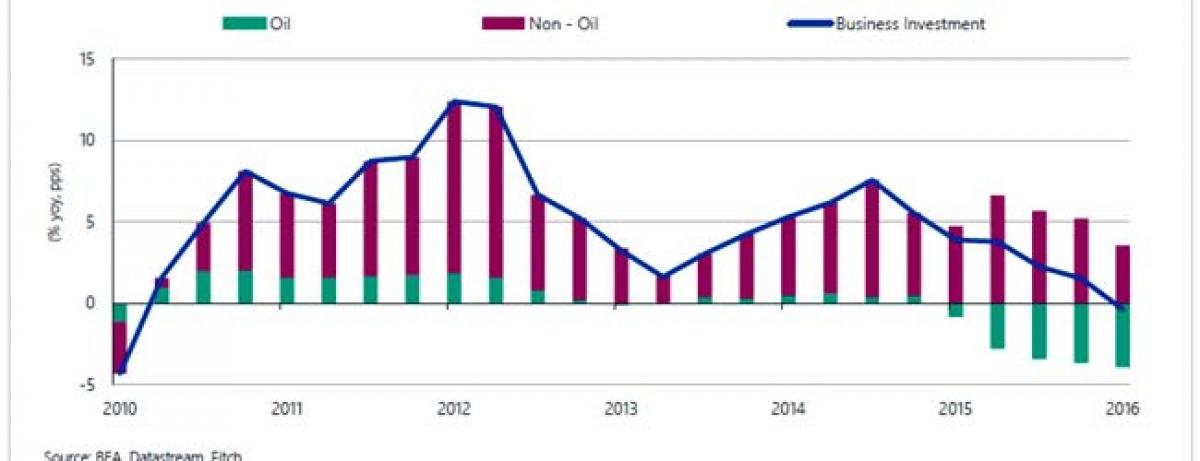Live
- PM Modi urges people to not get upset with 'insulting language' used against him by Congress
- North Korea touts ties with Russia on Kim-Putin summit anniversary
- CM Yadav-led MP Govt will run with full speed after LS polls: PM Modi
- EC sends notice to Cong over poll code violation by Rahul Gandhi, seeks reply by April 29
- CM Revanth flays BJP Policies and Alleges Conspiracy Against Reservations
- BMW's another all-electric car launched in India
- Kajol’s style mantra of the day: Life is short, let my pallu be long
- IPL 2024: Sometimes it works, sometimes it doesn't work, says R Sai Kishore on being held back till 19th over
- Treating politician differently from ordinary criminal will violate Constitution: ED tells SC on CM Kejriwal's plea
- Adverse weather conditions may hit mango crops in UP: Experts
Just In
US Forecasts Cut but Near-term Emerging Market Growth Pressure Eases


Weakness in emerging markets (EM) and adjustments to energy sector spending continue to weigh on global growth, Fitch Ratings says in its latest Global Economic Outlook (GEO).
Fitch Ratings-London : Weakness in emerging markets (EM) and adjustments to energy sector spending continue to weigh on global growth, Fitch Ratings says in its latest Global Economic Outlook (GEO).
The agency has sharply cut its forecast for US private investment growth and sees US 2016 GDP growing 1.8%, the first sub-2% growth since 2013. However, growth expectations for China have been revised up to 6.3% in 2016 and 2017, from 6.2% and 6% previously, as earlier policy stimulus gains traction and the authorities' commitment to stabilising near-term growth has strengthened.
"The near-term threat to emerging market growth has eased, due to a more assertive stimulus policy in China and the stabilisation of commodity prices," said Brian Coulton, Chief Economist at Fitch.
A decline in energy sector capital spending around the globe, China's investment slowdown and steep falls in domestic demand in Russia and Brazil have neutralised the benefits of lower oil prices on global growth over the last two years. Against this backdrop, worse-than-expected US 1Q16 GDP growth provided further evidence of the significant impact of external shocks on the economy, with exports declining for a second consecutive quarter, oil-related investment falling by a third and further declines in industrial production.
"It's unlikely that US consumer spending will be immune to the slowdown in the industrial sector. Nevertheless we don't see evidence of domestic private sector imbalances in the US that would push the economy into a deeper adjustment," said Mr. Coulton.
An intensification of external shocks would be a bigger threat to the economy, but the near-term EM growth picture is looking a little bit better. Most importantly, Chinese housebuilding has staged a recovery, which will have knock-on effects on the rest of the economy. Recent data from Russia have also surprised positively.
"We don't see any major reversal in accommodative policies in China soon, even if this contributes to further increases in leverage and slow progress on capacity reduction," added Mr. Coulton.
The weakening in the US dollar since late 2015 has also helped ease pressure on EM borrowers and currencies. Fitch cautions, however, that the dollar may strengthen later in 2016 as the Fed looks to resume interest rate increases in the second half of the year as near-term global risks diminish. With both the BOJ and ECB continuing to expand balance sheets aggressively and adopting negative policy rates, the divergence in global monetary policy cycles remains stark. Nevertheless, concerns about 'unintended consequences' will limit the extent of further moves into negative interest rate territory.
The eurozone's ongoing gradual recovery is on track with household spending supported by labour market improvements, low headline inflation and bank credit continuing to grow. Our forecast for the eurozone for 2016 has been revised up by 0.1% to 1.6%. Forecasts for the UK, however, have been revised down by 0.2% to 1.9% in 2016, reflecting the impact of uncertainty ahead of the Brexit referendum.
Global growth (based on an aggregate of 20 large developed and emerging economies (the 'Fitch 20')) is forecast at 2.5% in 2016, unchanged from 2015 and the same as forecast in the March GEO. Global growth should pick up to around 3% in 2017 as GDP stabilises in Russia and Brazil and the drag from energy adjustments starts to fade.
The GEO is available at www.fitchratings.com or by clicking the link above.

© 2024 Hyderabad Media House Limited/The Hans India. All rights reserved. Powered by hocalwire.com






